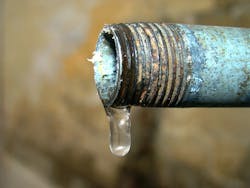In the early days of David St. Pierre’s career in process control, he had plenty of exposure to old pneumatic systems and single-loop controllers—by the late 1970s in oil refining, there were banks and banks of single-loop controllers. Not unlike what control software does today in a digital format, those controllers had to be precise. “You want it to work,” St. Pierre says. “If it fails, you blow up the town.”
But since moving over to water in 1986, St. Pierre has been amazed at what is lacking in the automation of the industry. “The difference between making gasoline and controlling water is night and day. It was like taking a step back in time,” he said. Part of the reason for the difference, he contends, is that water is inherently less dangerous than oil and gas. “Water isn’t going to blow up the town. There’s just not this real urgency to get it right.”
The automation advances that had taken place in the oil and gas industry were missing in water. Now, as executive director of the Metropolitan Water Reclamation District of Greater Chicago (MWRDGC) and vice president of the National Association of Clean Water Agencies (NACWA), St. Pierre sees obstacles in three main areas as the water industry tries to make its way into the digital world: automation, system health and labor.
“We have to figure out how to implement true automation in water,” St. Pierre urged industry professionals last month. He was keynoting a day-long workshop in Chicago called Modernizing North American Water Systems in the Digital Age. “In each city that I go into, they really aren’t applying normal control strategies, which have been tried and true for ages. I see programmers that are starting from scratch on a blank sheet of paper, trying to recreate control systems that already exist in the systems that they’re buying.”
The water industry needs to get past the idea that it has to do things differently than other industries, and instead embrace just automation fundamentals. “We think we’re unique. It’s simply not true,” St. Pierre said. “We need just simple process control implementation—using the physics that you understand and applying it to a system. We need to get to the fundamentals. We need to apply the tried and true.”
The second set of obstacles comes in the area of system health. Though water utilities have a network of systems that should be able to point to problems like lost water pressure in a fire hydrant, for example, the information isn’t getting where it needs to go.
In a water system in St. Louis, St. Pierre encountered a computerized maintenance management system (CMMS) that was so complicated, it was of little use. “We must’ve had 50 different codes to tell you what we were doing out in the field,” he recalled. “All you had was garbage going in and garbage coming out. There was no way you were going to utilize that system for information management.”
They set about figuring out what information was truly valuable. “I have to get good information out so it means something to me and helps me advance forward,” St. Pierre said. “We decided we needed three resolution codes instead of 50.”
Labor management is a huge aspect of keeping water utilities running efficiently that needs to be brought under control, St. Pierre also said. “Almost 70 percent of what I spend a year is labor,” he said. “Do you think it’s kind of important to figure out how to manage that labor and get value out of that labor? It probably is.”
Using St. Louis as an example again, St. Pierre referenced the pump station group, made up primarily of mechanics and instrumentation folks. “The mechanics had never worked on a pump,” he explained. “Instead, what were we doing? We were hauling out failed pumps—failures upon failures. It was a very expensive way to do business. If you drove your car that way, you wouldn’t want a car. It’s not really asset management.” So he sent the mechanics to pump school.
Many water utilities simply need to implement basic asset management, St. Pierre insisted. “The equipment we have in water is pretty simple equipment. It’s nothing unique—it’s compressors and blowers and pumps. They should have a standard timeframe reference,” he said. Utilizing predictive sensors correctly would also go a long way, he added.
“There is such a need in water for the fundamentals. Once you get those fundamentals down, you can start becoming the excellent agencies that we want to be,” St. Pierre concluded. “If we want to accelerate the advancement of digitalization in water, it’s really all about getting the fundamentals right.”

